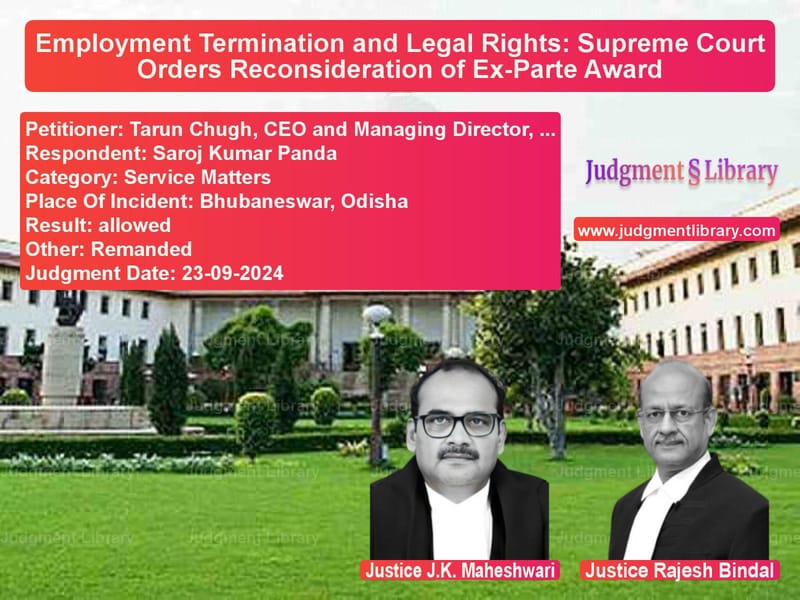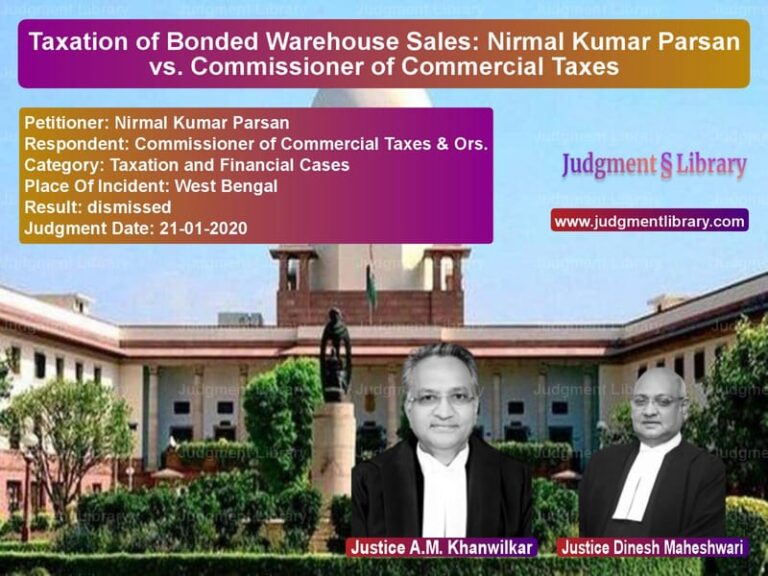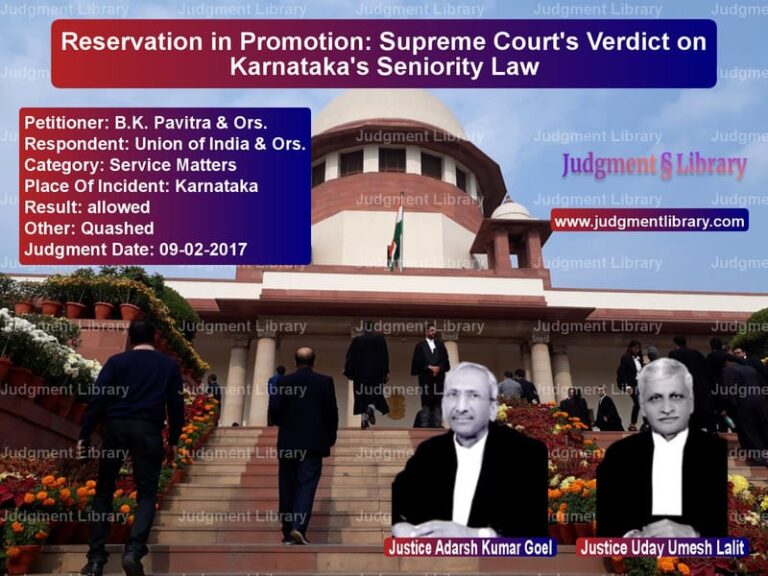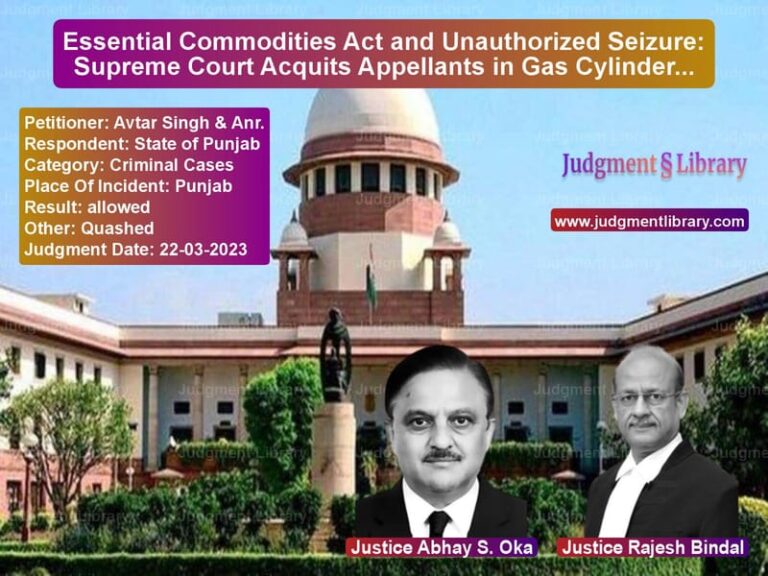Employment Termination and Legal Rights: Supreme Court Orders Reconsideration of Ex-Parte Award
The case of Tarun Chugh, CEO and Managing Director, Bajaj Allianz Life Insurance Company Ltd. vs. Saroj Kumar Panda dealt with the legality of an ex-parte award issued by the Central Government Industrial Tribunal regarding an employment termination dispute. The Supreme Court overturned the decision of the High Court of Orissa, which had upheld the tribunal’s award, and remitted the case back for fresh adjudication.
Background of the Case
The respondent, Saroj Kumar Panda, was employed as a Branch Accountant at Bajaj Allianz Life Insurance Company Ltd. on May 9, 2006. Over the years, he was promoted to the position of Senior Divisional Accountant in Grade L(IA) and later redesignated as a Business Supporting Officer (Managerial Post) from August 1, 2014. He was subsequently transferred within different departments, ultimately being placed in Agency Sales on May 15, 2017.
On July 25, 2017, Panda’s employment was terminated due to organizational restructuring. The company issued a termination letter and transferred Rs. 1,07,787 to his bank account in lieu of notice. He had been earning a salary of Rs. 35,929 per month at the time of termination.
Legal Dispute and Tribunal Award
Challenging his termination, Panda filed a claim before the Central Government Industrial Tribunal (CGIT), Bhubaneswar, in 2017, seeking reinstatement, back wages, and service benefits. The tribunal, in an ex-parte award dated February 5, 2019, ruled in favor of the respondent, directing the company to reinstate him with full back wages and service benefits.
The tribunal’s award was later challenged before the Orissa High Court, which dismissed the petition and upheld the ex-parte award. The company then appealed to the Supreme Court.
Key Legal Issues
- Was the respondent a ‘workman’ under the Industrial Disputes Act, 1947, and entitled to seek relief from the tribunal?
- Did the tribunal have jurisdiction over the matter?
- Was the tribunal justified in passing an ex-parte award in the absence of the company’s proper representation?
- Should the company’s plea for re-examination of the case be allowed?
Arguments by the Appellant (Bajaj Allianz Life Insurance Company Ltd.)
The appellant, represented by senior counsel, contended that:
- The respondent was holding a managerial post and did not qualify as a ‘workman’ under the Industrial Disputes Act, 1947.
- The tribunal proceeded ex-parte without proper representation from the company due to an error on the part of the counsel and management staff.
- The legal and human resource officers handling the case left the company during the tribunal proceedings, leading to mismanagement of the case.
- The ex-parte award was passed without examining whether the tribunal had jurisdiction over the dispute.
Arguments by the Respondent (Saroj Kumar Panda)
The respondent countered these claims, arguing:
- He was wrongly terminated, and the tribunal correctly exercised its jurisdiction in granting relief.
- The company was well aware of the tribunal proceedings but failed to appear, leading to the ex-parte decision.
- The tribunal duly served notice to the company, and it cannot claim unfair treatment when it ignored legal proceedings.
- The High Court correctly upheld the award, as no procedural error was committed.
Supreme Court’s Observations
1. Legality of the Ex-Parte Award
The Court held that tribunals must ensure that all parties have had a fair opportunity to present their case before issuing an ex-parte award:
“The tribunal, before passing an ex-parte award, must be satisfied that the absence of the employer was intentional and not due to unavoidable circumstances.”
2. Role of the Employer in Proceedings
The Court acknowledged that the company’s legal officers left during the tribunal proceedings, leading to procedural lapses:
“The company had entrusted the case to its legal team, which failed to take necessary actions. While negligence cannot be excused, a fair hearing is a fundamental right that cannot be denied.”
3. Determination of ‘Workman’ Status
The Court emphasized that the tribunal failed to properly determine whether the respondent was a workman under the Industrial Disputes Act:
“The tribunal should have first adjudicated whether the respondent met the definition of ‘workman’ before passing the award.”
4. Fairness and Natural Justice
The Court ruled that denying the company an opportunity to present its case would be a violation of principles of natural justice:
“The right to be heard is fundamental to any judicial or quasi-judicial proceeding. Failure to allow the appellant to present its case undermines the fairness of the award.”
Final Judgment
The Supreme Court set aside the ex-parte award and remanded the case back to the tribunal for fresh adjudication:
“The appeal is allowed. The order of the High Court and the ex-parte award of the tribunal are set aside. The matter is remanded for fresh consideration, ensuring that all parties have a fair opportunity to present their case.”
Impact of the Judgment
The ruling has significant implications for employment disputes and industrial tribunal proceedings:
- Tribunals must ensure fair hearings before passing ex-parte awards.
- Jurisdictional issues must be resolved first to determine if the claimant qualifies as a ‘workman.’
- Employers must diligently track legal proceedings to avoid adverse judgments due to absence.
- Procedural fairness is essential in industrial disputes to uphold natural justice.
This judgment reinforces the principle that employment disputes must be adjudicated fairly, ensuring both employers and employees receive a just hearing.
Petitioner Name: Tarun Chugh, CEO and Managing Director, Bajaj Allianz Life Insurance Company Ltd..Respondent Name: Saroj Kumar Panda.Judgment By: Justice J.K. Maheshwari, Justice Rajesh Bindal.Place Of Incident: Bhubaneswar, Odisha.Judgment Date: 23-09-2024.
Don’t miss out on the full details! Download the complete judgment in PDF format below and gain valuable insights instantly!
Download Judgment: tarun-chugh,-ceo-and-vs-saroj-kumar-panda-supreme-court-of-india-judgment-dated-23-09-2024.pdf
Directly Download Judgment: Directly download this Judgment
See all petitions in Employment Disputes
See all petitions in Termination Cases
See all petitions in Disciplinary Proceedings
See all petitions in Judgment by J.K. Maheshwari
See all petitions in Judgment by Rajesh Bindal
See all petitions in allowed
See all petitions in Remanded
See all petitions in supreme court of India judgments September 2024
See all petitions in 2024 judgments
See all posts in Service Matters Category
See all allowed petitions in Service Matters Category
See all Dismissed petitions in Service Matters Category
See all partially allowed petitions in Service Matters Category







